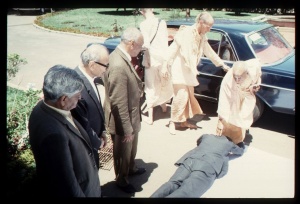SB 11.4.21: Difference between revisions
m (1 revision(s)) |
No edit summary |
||
| Line 1: | Line 1: | ||
{{info | {{info | ||
|speaker=Drumila (one of the nine Yogendra sages) | |speaker=Drumila (one of the nine Yogendra sages) | ||
|listener=King Nimi (Videha) | |listener=King Nimi (Videha) | ||
}} | }} | ||
[[Category:Srimad-Bhagavatam - Canto 11 Chapter 04]] | |||
[[Category:Bhagavatam Verses Spoken by Drumila (one of the nine Yogendra sages) - Vanisource|110421]] | |||
<div style="float:left">'''[[Srimad-Bhagavatam]] - [[SB 11|Eleventh Canto]] - [[SB 11.4: Drumila Explains the Incarnations of Godhead to King Nimi|Chapter 4: Drumila Explains the Incarnations of Godhead to King Nimi]]'''</div> | |||
<div style="float:right">[[File:Go-previous.png|link=SB 11.4.20]] '''[[SB 11.4.20]] - [[SB 11.4.22]]''' [[File:Go-next.png|link=SB 11.4.22]]</div> | |||
{{RandomImage}} | |||
{{SBnotice}} | |||
==== TEXT 21 ==== | ==== TEXT 21 ==== | ||
<div | <div class="verse"> | ||
niḥkṣatriyām akṛta gāṁ ca triḥ-sapta-kṛtvo | :niḥkṣatriyām akṛta gāṁ ca triḥ-sapta-kṛtvo | ||
rāmas tu haihaya-kulāpyaya-bhārgavāgniḥ | :rāmas tu haihaya-kulāpyaya-bhārgavāgniḥ | ||
so 'bdhiṁ babandha daśa-vaktram ahan sa-laṅkaṁ | :so 'bdhiṁ babandha daśa-vaktram ahan sa-laṅkaṁ | ||
sītā-patir jayati loka-mala-ghna-kīṛtiḥ | :sītā-patir jayati loka-mala-ghna-kīṛtiḥ | ||
</div> | </div> | ||
| Line 17: | Line 22: | ||
==== SYNONYMS ==== | ==== SYNONYMS ==== | ||
<div | <div class="synonyms"> | ||
niḥkṣatriyām—devoid of members of the warrior class; akṛta—He made; gām—the earth; ca—and; triḥ-sapta-kṛtvaḥ—three times seven (twenty-one) times; rāmaḥ—Lord Paraśurāma; tu—indeed; haihaya-kula—of the dynasty of Haihaya; apyaya—the destruction; bhārgava—descending from Bhṛgu Muni; agniḥ—the fire; saḥ—He; abdhim—the ocean; babandha—brought under subjection; daśa-vaktram—the ten-headed Rāvaṇa; ahan—killed; sa-laṅkam—along with all the soldiers of his kingdom, Laṅkā; sītā-patiḥ—Lord Rāmacandra, the husband of Sītā; jayati—is always victorious; loka—of the entire world; mala—the contamination; ghna—which destroys; kīrtiḥ—the recounting of whose glories. | niḥkṣatriyām—devoid of members of the warrior class; akṛta—He made; gām—the earth; ca—and; triḥ-sapta-kṛtvaḥ—three times seven (twenty-one) times; rāmaḥ—Lord Paraśurāma; tu—indeed; haihaya-kula—of the dynasty of Haihaya; apyaya—the destruction; bhārgava—descending from Bhṛgu Muni; agniḥ—the fire; saḥ—He; abdhim—the ocean; babandha—brought under subjection; daśa-vaktram—the ten-headed Rāvaṇa; ahan—killed; sa-laṅkam—along with all the soldiers of his kingdom, Laṅkā; sītā-patiḥ—Lord Rāmacandra, the husband of Sītā; jayati—is always victorious; loka—of the entire world; mala—the contamination; ghna—which destroys; kīrtiḥ—the recounting of whose glories. | ||
</div> | </div> | ||
{{SBcollapse}} | |||
==== TRANSLATION ==== | ==== TRANSLATION ==== | ||
<div | <div class="translation"> | ||
Lord Paraśurāma appeared in the family of Bhṛgu as a fire that burned to ashes the dynasty of Haihaya. Thus Lord Paraśurāma rid the earth of all kṣatriyas twenty-one times. The same Lord appeared as Rāmacandra, the husband of Sītādevī, and thus He killed the ten-headed Rāvaṇa, along with all the soldiers of Laṅkā. May that Śrī Rāma, whose glories destroy the contamination of the world, be always victorious. | Lord Paraśurāma appeared in the family of Bhṛgu as a fire that burned to ashes the dynasty of Haihaya. Thus Lord Paraśurāma rid the earth of all kṣatriyas twenty-one times. The same Lord appeared as Rāmacandra, the husband of Sītādevī, and thus He killed the ten-headed Rāvaṇa, along with all the soldiers of Laṅkā. May that Śrī Rāma, whose glories destroy the contamination of the world, be always victorious. | ||
</div> | </div> | ||
| Line 31: | Line 36: | ||
==== PURPORT ==== | ==== PURPORT ==== | ||
<div | <div class="purport"> | ||
According to Śrīla Śrīdhara Svāmī, Lord Rāmacandra was more or less a contemporary incarnation for the nine Yogendras. Thus they have offered particular respect to Lord Rāmacandra, as indicated by the word jayati. | According to Śrīla Śrīdhara Svāmī, Lord Rāmacandra was more or less a contemporary incarnation for the nine Yogendras. Thus they have offered particular respect to Lord Rāmacandra, as indicated by the word ''jayati''. | ||
</div> | </div> | ||
__NOTOC__ | </div> | ||
</div> | |||
<div style="float:right">[[File:Go-previous.png|link=SB 11.4.20]] '''[[SB 11.4.20]] - [[SB 11.4.22]]''' [[File:Go-next.png|link=SB 11.4.22]]</div> | |||
__NOTOC__ | |||
__NOEDITSECTION__ | |||
Revision as of 14:00, 17 June 2021

A.C. Bhaktivedanta Swami Prabhupada
Please note: The synonyms, translation and purport of this verse were composed by disciples of Śrīla Prabhupāda
TEXT 21
- niḥkṣatriyām akṛta gāṁ ca triḥ-sapta-kṛtvo
- rāmas tu haihaya-kulāpyaya-bhārgavāgniḥ
- so 'bdhiṁ babandha daśa-vaktram ahan sa-laṅkaṁ
- sītā-patir jayati loka-mala-ghna-kīṛtiḥ
SYNONYMS
niḥkṣatriyām—devoid of members of the warrior class; akṛta—He made; gām—the earth; ca—and; triḥ-sapta-kṛtvaḥ—three times seven (twenty-one) times; rāmaḥ—Lord Paraśurāma; tu—indeed; haihaya-kula—of the dynasty of Haihaya; apyaya—the destruction; bhārgava—descending from Bhṛgu Muni; agniḥ—the fire; saḥ—He; abdhim—the ocean; babandha—brought under subjection; daśa-vaktram—the ten-headed Rāvaṇa; ahan—killed; sa-laṅkam—along with all the soldiers of his kingdom, Laṅkā; sītā-patiḥ—Lord Rāmacandra, the husband of Sītā; jayati—is always victorious; loka—of the entire world; mala—the contamination; ghna—which destroys; kīrtiḥ—the recounting of whose glories.
Translation and purport composed by disciples of Śrīla Prabhupāda
TRANSLATION
Lord Paraśurāma appeared in the family of Bhṛgu as a fire that burned to ashes the dynasty of Haihaya. Thus Lord Paraśurāma rid the earth of all kṣatriyas twenty-one times. The same Lord appeared as Rāmacandra, the husband of Sītādevī, and thus He killed the ten-headed Rāvaṇa, along with all the soldiers of Laṅkā. May that Śrī Rāma, whose glories destroy the contamination of the world, be always victorious.
PURPORT
According to Śrīla Śrīdhara Svāmī, Lord Rāmacandra was more or less a contemporary incarnation for the nine Yogendras. Thus they have offered particular respect to Lord Rāmacandra, as indicated by the word jayati.